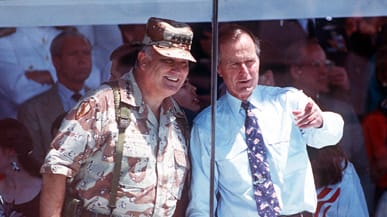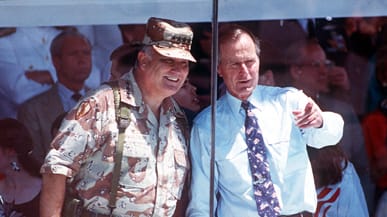All of the president's men huddled in Texas this week to give themselves good marks for the conduct of Desert Storm, 20 years to the day after it started. Not so fast. Former President George H.W. Bush predicted "history will say that we did this right." This reminds us of a chief function of history: to restore credibility and perspective to wildly contorted current events.
In fact, a great deal went wrong in the Iraq-Kuwait crisis of 1990-91. The Bush administration's vacillating policy toward the Iraqi dictator may have emboldened Saddam to invade Kuwait in the first place. President Bush, who as vice president had coordinated much of the U.S. military and economic aid to Saddam during his eight-year war with Iran, had been trying since 1989 to coax Saddam into an alliance with the U.S. against Iran. Bush's ambassador to Iraq, April Glaspie, shared the president's desire to "moderate" Saddam Hussein with incentives, such as Secretary of State Baker's cable in July 1990 that purported "to take no position on the border delineation issue raised by Iraq with respect to Kuwait." Saddam was threatening Kuwait with war if the emir did not surrender (oil-producing) territory on his border with Iraq and forgive $14 billion in Iraqi debt. Baker's failure to deliver a stern warning to Baghdad may have signaled to Saddam that he could proceed. He saw an opening in Baker's apparent indifference on the border issue. What if he left Kuwait largely intact, but looted the country, and annexed Kuwaiti oil fields and one or two of Kuwait's islands? Perhaps the Bush administration would permit that.

The endgame of the war was even more poorly played than the pregame. Successful wars must be brought to an end by a close synchronization of diplomacy and battlefield operations. Civilian decision-makers must nudge generals in the field toward the strategic objective. The Bush 41 administration struggled to elucidate strategic objectives in the war—wavering dangerously between expressions of limited war (evicting Saddam from Kuwait) and unlimited war (inciting Iraqi officers, Kurds, or Shiites to overthrow him)— and failed utterly to communicate what garbled objectives they did botch together to the generals in the field.
Surprised by the sudden collapse of Iraqi resistance in February 1991 after just 100 hours of ground operations, the Bush administration—advised by Generals Powell and Schwarzkopf—decided to make the eviction of Iraq from Kuwait and a "grinding down" of the Iraqi military its strategic objectives. But the slaughter on the "Highway of Death," along which the Iraqis were retreating from Kuwait, persuaded Bush to stop the war—without Saddam even asking—so as to not sully the image of the U.S. Bush had confidently predicted that Iraqi "troops will straggle home with no armor, beaten up, 50,000," but they actually came home with one-quarter of their tanks and half of their armored personnel carriers. Saddam later boasted that Bush had yielded in the war, not Saddam, for the Iraqi leader had never asked for terms.
Bush has given himself an A- for Desert Storm, allowing that “there are certain things that I could have done better.” In truth, Desert Storm merits no more than a C.
The cease-fire ending the war was badly managed. Although President Bush lamented the absence of a "Battleship Missouri" moment, the Missouri was actually available, on station in the Persian Gulf, and Schwarzkopf wanted to use it, but was deterred by the logistics of transporting coalition representatives and reporters to the battleship on short notice. Safwan—an Iraqi airfield just over the border from Kuwait—would have to do. Yet none of the coalition partners insisted on Saddam's presence at the surrender ceremony, which was a glaring oversight. President Bush wanted Saddam there, but recalled that he and his advisers "asked ourselves what we would do if he refused." Continue the war? Bad. Retreat from the demand of Saddam's attendance? Worse. Powell and Schwarzkopf thus contented themselves with two Iraqi generals, and Bush did not insist on anything more. The "Washington hawks"—Cheney and Wolfowitz in particular—felt certain that Powell and Schwarzkopf were being played by Saddam, and letting relatively minor military considerations trump long-term political ones. Although Westerners treated beaten enemies with respect, Middle Easterners regarded such courtesy as weakness. "Norm went in uninstructed," a senior Bush administration official recalled. "He should have had instructions," but he didn't. "The process broke down. The generals made an effort not to be guided. It was treated as something that was basically a military decision, not to be micromanaged." Chas Freeman, the U.S. ambassador to Saudi Arabia, spoke of "a total failure of integration between military and political strategy."
Having seemed to settle on limited aims, Bush casually expanded them, enjoining Iraqis to rise up and overthrow Saddam. His actual words were not stirring—"In my own view, I've always said it would be—that the Iraqi people should put him aside and that would facilitate the resolution of all these problems that exist, and would certainly facilitate the acceptance of Iraq back into the family of peace-loving nations"—but they sufficed to trigger an uprising, which further complicated the war's termination. Suddenly the U.S. was responsible for all of those rebels answering Bush's call to arms. Yet at the Safwan negotiations, Schwarzkopf carelessly authorized the Iraqis to use helicopter gunships on their side of the cease-fire line. The Iraqi generals were so surprised by that concession—which permitted them to strafe and rocket Kurds and Shiites from the air—that one of the Iraqi generals incredulously asked: "So you mean even the helicopters that are armed can fly in the Iraqi skies?" Having first foresworn a breakup of Iraq and then encouraged one, the Bush administration spent the last days of the conflict watching its would-be insurgents being hunted into "no-fly zones" and debating what to do. Bush finally accepted Scowcroft's position that he must leave Iraq united and reasonably strong to balance Iranian power. Powell and Schwarzkopf warned against any "Lebanonization" of Iraq that, as Powell put it, would leave Washington to "sort out 2,000 years of Mesopotamian history." It's too bad they didn't enforce that view until after all of those Iraqis had been driven from their homes and slaughtered.
Overall, Bush 41's careless termination of the Persian Gulf War arguably sowed the seeds of the Bush 43 administration's invasion of Iraq. No demand was made for the surrender of WMD. The Republican Guard pulled off a "desert Dunkirk" to fight another day. Neo-cons like Paul Wolfowitz, who served in Cheney's Pentagon and protested the mildness of the war's end, were later emboldened to go "all the way" in Iraq, reasoning that great opportunities for regime change had been squandered in 1991.
Bush has given himself an A- for Desert Storm, allowing that "there are certain things that I could have done better." In truth, Desert Storm merits no more than a C. It broke out in part because of a lack of vigilance and firmness in Washington. It ended amid a welter of confusion and imprecision that emboldened Saddam to have another run at the international system in 2003.
Dr. Geoffrey Wawro is the General Olinto Mark Barsanti Professor of Military History and Director of the Military History Center at the University of North Texas. He is the author of Quicksand: America's Pursuit of Power in the Middle East (Penguin Press, 2010.)

